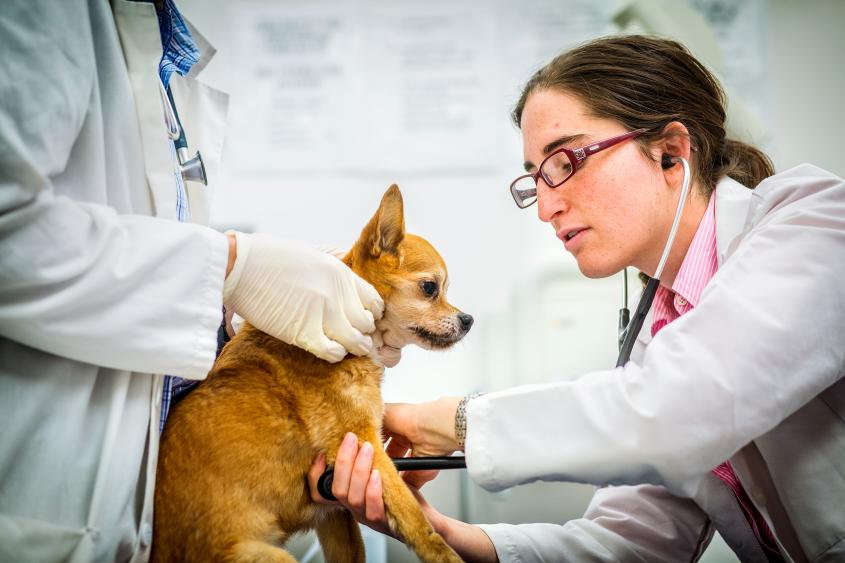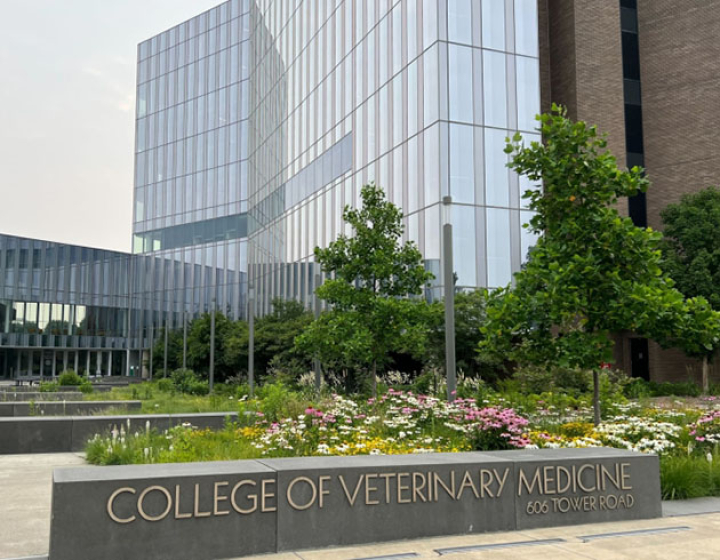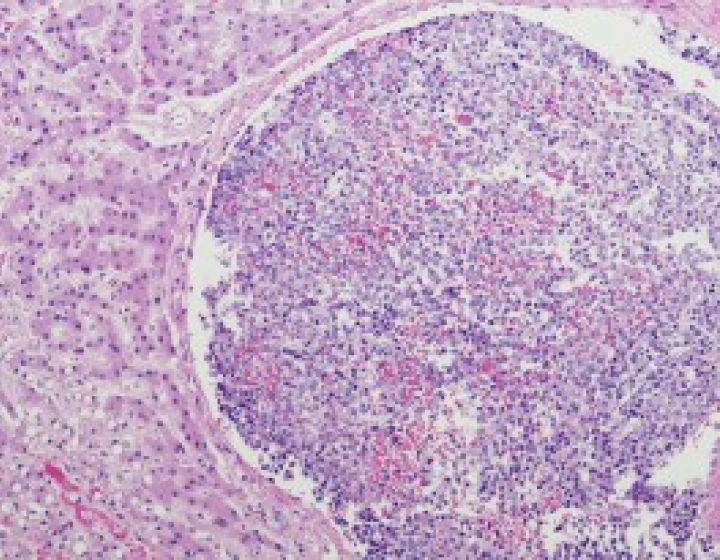Riney Canine Health Center awards $1.3M for new research
The Cornell Richard P. Riney Canine Health Center (RCHC) recently awarded more than $1.26 million to fuel seven internal research studies led by faculty across the College of Veterinary Medicine. While advancing the understanding of canine diseases, these two-year projects will also explore new avenues for diagnosing chronic pain and develop new models for testing therapies catered to dogs' immune systems.
“Our goal is to create a significant and sustainable source of funds to support canine research using a rigorous and efficient peer-reviewed process. This reduces the amount of time researchers need to spend writing grant proposals and allows them to focus on what they do best — pursuing innovative research to help dogs,” says David E. Lee ’88, D.V.M. ’94, M.B.A. ’99, the associate dean for external programs, RCHC interim director and director of the Center for Veterinary Business and Entrepreneurship.
The annual RCHC internal grants program provides support for a wide range of canine health studies, including issues that span aging, behavior, cancer biology, genetics and genomics, infectious diseases, immunology and nutrition. This funding can be used for any phase of the research pipeline, as the RCHC intentionally helps close the gap between basic discoveries, exploratory work, and translational and clinical research.
“Investing in ideas and speeding up the research cycle is the best way to create real hope for our canine companions and the people who share their lives,” Lee says.
The seven projects awarded funding are:
Potential of spatially fractionated radiation therapy for treating canine osteosarcomas:
Osteosarcoma is the most common type of bone cancer in dogs and also highly aggressive. This project will investigate a non-invasive treatment method that delivers a series of patterned radiation beams to the tumor to try to kill nearby cancer cells. The goal is to learn more about this therapy to improve treatment and ultimately provide more comfort, limb function and longer survival times for dogs with this type of cancer.
-
PI: Parminder Basran, associate research professor of medical oncology
-
Co-PI: Margaret McEntee, the Alexander de Lahunta Chair of the Department of Clinical Sciences
A diagnostic test for canine hemangiosarcoma using novel miRNA biomarkers:
This type of vascular cancer is often referred to as “the silent killer” for its ability to spread quickly without warning — up until its tumors rupture, causing dogs to bleed internally and then collapse. In the emergency room, however, clinicians need better tools to pinpoint the source of collapse and develop a rapid response. To improve diagnostics, the researchers will identify biomarkers that can rapidly identify the signs of this cancer, allowing both the emergency room team and the owners to make more accurately informed decisions about the dog’s care plan.
-
PI: Scott Coonrod, director of the Baker Institute for Animal Health
-
Co-PI: Roy Cohen, assistant research professor
Genetic investigation of chronic superficial keratitis in working dog breeds:
German Shepherd Dogs and Belgian Shepherd breeds are known for their intelligence and trainability, allowing them to excel in service-oriented roles with police, military and people with disabilities. Yet these breeds also experience an increased risk of developing a progressive eye disease that can end in blindness. The goal of this research is to identify the genetic factors behind its onset, which will provide the necessary details for developing both genetic tests and better therapies.
-
PI: Jacquelyn Evans, assistant professor of biomedical sciences
Investigation of cell-free DNA in dogs with hepatocellular carcinoma:
Cell-free DNA (cfDNA) are small fragments that circulate in the bloodstream after cells die, and they provide promising evidence for tools that monitor the early detection and progression of diseases like cancer — both in dogs and in humans. The goal of this project is to sequence the DNA of tumors in dogs to identify their cancerous mutations and then compare those to the fragments detected in the dogs’ cfDNA. For the most common form of liver cancer, hepatocellular carcinoma, the ability to characterize the cfDNA will transform clinical diagnostics and treatment.
-
PI: Jessica Hayward, senior research associate at the Cornell Veterinary Biobank
-
Co-PI: Kelly Hume, associate professor of oncology
Helping more dogs — supplements and drug repurposing for canine lymphoma:
Affecting 1 in 15 dogs, lymphoma is a highly aggressive type of canine cancer. But up to half of the dogs diagnosed with this disease may never receive treatment due to the notable costs associated with multi-drug chemotherapy. This new project will enroll dogs treated by the Cornell University Hospital for Animals’ Oncology Service in a study to evaluate the effectiveness of more affordable drug combinations.
-
PI: Kelly Hume, associate professor of oncology
ATP release pannexin channels are potential pain biosensors for dogs:
Both during injury and throughout chronic illness, it can be hard to know exactly how much pain a dog experiences. The project aims to develop a new method for reliably assessing canine pain through the identification of a new molecular target (or biosensor) that could also deliver pain-relief medication more effectively. This collaboration between basic scientists and clinical experts will allow the team to gather and test samples from patients at the Cornell University Hospital for Animals, then thoroughly investigate the biosensors regulating the pathways of inflammatory, mechanical and neuropathic pain.
-
PI: Toshi Kawate, associate professor of molecular medicine
-
Co-PI: Jordyn Boesch, associate clinical professor of anesthesiology and pain medicine
The next frontier: Generation of novel caninized mouse models in pursuit of novel therapeutics and interventions in canine health:
This project strives to recreate a model of the canine immune system by transplanting dogs’ stem cells into mice that already lack immunity. If successful, this work will give scientists a reliable way to investigate how different diseases interact with animals’ bodies throughout all stages of progression and regression. Similar work has already been done to humanize immune systems in mice, and the ultimate development of a “caninized” mouse model will transform researchers’ ability to study canine disease.
-
PI: Tracy Stokol, professor of population medicine and diagnostic sciences
-
Co-PI: Cynthia Leifer, professor of immunology
-
Co-investigator: Alina Demeter, assistant clinical professor of biomedical sciences
Learn more about the 2022-2023 research awards on the RCHC website.
Written by Jana Wiegand






